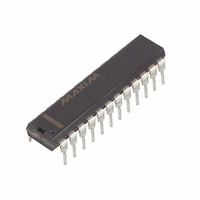DS1742W-120+ Maxim Integrated Products, DS1742W-120+ Datasheet - Page 4

DS1742W-120+
Manufacturer Part Number
DS1742W-120+
Description
IC RTC RAM Y2K 3.3V 120NS 24EDIP
Manufacturer
Maxim Integrated Products
Type
Clock/Calendar/NVSRAM/Y2Kr
Datasheet
1.DS1742-100IND.pdf
(16 pages)
Specifications of DS1742W-120+
Memory Size
16K (2K x 8)
Time Format
HH:MM:SS (24 hr)
Date Format
YY-MM-DD-dd
Interface
Parallel
Voltage - Supply
3 V ~ 3.6 V
Operating Temperature
0°C ~ 70°C
Mounting Type
Through Hole
Package / Case
24-DIP (600 mil) Module
Function
Clock/Calendar/NV Timekeeping RAM
Rtc Memory Size
2048 Byte
Supply Voltage (max)
3.63 V
Supply Voltage (min)
2.97 V
Maximum Operating Temperature
+ 70 C
Minimum Operating Temperature
0 C
Mounting Style
Through Hole
Rtc Bus Interface
Parallel
Supply Current
15 mA
Lead Free Status / RoHS Status
Lead free / RoHS Compliant
SETTING THE CLOCK
As shown in Table 2, bit 7 of the century register is the write bit. Setting the write bit to a 1, like
the read bit, halts updates to the DS1742 registers. The user can then load them with the
correct day, date and time data in 24-hour BCD format. Resetting the write bit to a 0 then
transfers those values to the actual clock counters and allows normal operation to resume.
STOPPING AND STARTING THE CLOCK OSCILLATOR
The clock oscillator may be stopped at any time. To increase the shelf life, the oscillator can be
turned off to minimize current drain from the battery. The
seconds registers, see Table 2. Setting it to a 1 stops the oscillator.
FREQUENCY TEST BIT
As shown in Table 2, bit 6 of the day byte is the frequency test bit. When the frequency test bit
is set to logic 1 and the oscillator is running, the LSB of the seconds register will toggle at 512
Hz. When the seconds register is being read, the DQ0 line will toggle at the 512 Hz frequency
as long as conditions for access remain valid (i.e.,
seconds register remain valid and stable).
CLOCK ACCURACY
The DS1742 is guaranteed to keep time accuracy to within ±1 minute per month at 25°C. Dallas
Semiconductor calibrates the RTC at the factory using nonvolatile tuning elements. The
DS1742 does not require additional calibration. For this reason, methods of field clock
calibration are not available and not necessary. Clock accuracy is also affected by the electrical
environment and caution should be taken to place the RTC in the lowest level EMI section of
the PCB layout. For additional information refer to Application Note 58.
Table 2. REGISTER MAP
OSC = STOP BIT
W = WRITE BIT
Note: All indicated “X” bits are not used but must be set to “0” during write cycle to ensure proper clock operation.
ADDRES
7FD
7FC
7FF
7FE
7FB
7FA
7F9
7F8
S
OSC
BF
B
W
X
X
X
X
7
R = READ BIT
X = SEE NOTE BELOW
FT
B
R
X
X
X
6
10 Year
10 Seconds
10 Minutes
B
10 Century
X
X
5
10 Date
10 Hour
Month
DATA
10
B
X
4
FT = FREQUENCY TEST
BF = BATTERY FLAG
B
X
4 of 16
3
Seconds
Minutes
Century
B
Month
CE
Hour
Year
Date
2
low,
Day
B
1
OE
OSC
B
low,
0
bit is the MSB (bit 7) of the
FUNCTION
WE
Seconds
Minutes
Control
Month
Year
Date
Hour
Day
high, and address for
RANGE
00–99
01–12
01–31
01–07
00–23
00–59
00–59
00–39
DS1742












